‘Wake-up call’ for Merkel’s CDU party as it slumps to defeat in state elections
Long-ruling German leader’s CDU party defeated in two state elections

Your support helps us to tell the story
From reproductive rights to climate change to Big Tech, The Independent is on the ground when the story is developing. Whether it's investigating the financials of Elon Musk's pro-Trump PAC or producing our latest documentary, 'The A Word', which shines a light on the American women fighting for reproductive rights, we know how important it is to parse out the facts from the messaging.
At such a critical moment in US history, we need reporters on the ground. Your donation allows us to keep sending journalists to speak to both sides of the story.
The Independent is trusted by Americans across the entire political spectrum. And unlike many other quality news outlets, we choose not to lock Americans out of our reporting and analysis with paywalls. We believe quality journalism should be available to everyone, paid for by those who can afford it.
Your support makes all the difference.Chancellor Angela Merkel’s Christian Democratic Union party has suffered historically bad state election results, described by one senior member as a “wake-up call”, just six months before a national vote that will determine who succeeds Germany’s long-time leader.
Final results early Monday confirmed that the centre-right CDU was defeated in elections by two popular incumbent state governors: the Green party’s Winfried Kretschmann in Baden-Wuerttemberg and the centre-left Social Democrats’ Malu Dreyer in Rhineland-Palatinate.
It lost the two states — both of which were once strongholds, but have long since slipped from its grasp — by about eight percentage points. It won 24.1% of the vote in Baden-Wuerttemberg and 27.7% in Rhineland-Palatinate, its worst showings there since World War II.
Sunday’s results “are a wake-up call for the entire CDU,” senior lawmaker Norbert Roettgen told the Rheinische Post newspaper.
The elections will be followed by four more state elections and the national election scheduled for September 26. Merkel has been in office for four terms now — almost 16 years.
Read more:
Merkel’s federal government faces discontent over a slow start to Germany’s coronavirus vaccination drive, while most restrictions remain in place and infections are rising again.
And her centre-right bloc has been hit over the past two weeks by allegations that a few lawmakers profited from deals to procure masks early in the coronavirus pandemic.
Paul Ziemiak, CDU’s general secretary told reporters, “To say it very clearly, this isn’t a good evening for the CDU,” adding that “we would have liked different, better results.” He however acknowledged that the corruption allegations and the poor handling of the Covid-19 pandemic might be the reasons that damaged CDU.
The party also has still to decide who will run to succeed Merkel in the Sept. 26 national election. Germany’s leader since 2005, long a powerful draw for voters, isn’t seeking a fifth term.
According to Reuters, Robert Habeck, co-leader of the Greens said, “This is a super start to the super election year.” He added, “And we will hopefully be able to take the tailwind from Baden-Wuerttemberg and Rhineland-Palatinate at full sail.”
In the two states, more than 10 million people were invited to cast their ballot.
The Green Party governor Winfried Kretschmann, 72, who has been in coalition with the CDU as his junior party, might now be able to choose new allies, according to reports. Kretschmann has been popular with centrist voters in the state.
The state elections gave the environmentalist and traditionally left-leaning Greens new confidence for the national election campaign, in which they are expected to make their first bid for the chancellery.
And the vote gave some comfort to the centre-left Social Democrats, who have been struggling with dismal federal poll ratings. National polls have shown the CDU and CSU still well ahead of the Greens and Social Democrats, despite softening support.The Social Democrats’ candidate for chancellor, Finance Minister Olaf Scholz, said the results showed that “forming a government is possible without the CDU”.
One party which did not benefit on Sunday was the far-right Alternative for Germany.
The party lost about a third of its support compared with strong showings in 2016, taking 9.7% of the vote in Baden-Wuerttemberg and 8.3% in Rhineland-Palatinate.
Join our commenting forum
Join thought-provoking conversations, follow other Independent readers and see their replies
Comments